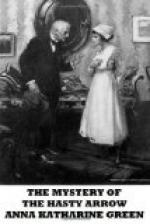“I understand.” Sweetwater was quite himself again. “But do you know that this is no easy task you are giving me, Mr. Gryce. Where a man has but two coats, or three at best, it might not be so hard, perhaps, to get at them. But some men have a dozen, and if I don’t mistake——”
“Sweetwater, I meant to give you a task of no little difficulty. It will keep you out of mischief.”
XV
NEWS FROM FRANCE
For the next three days the impatience of the public met with nothing but disappointment. The police were reticent,—more reticent far than usual,—and the papers, powerless to add to the facts already published, had little but conjectures to offer.
The hunt for Madame Duclos continued, joined in now by the general public. But for all the efforts made, aided by a careful search through her entire baggage, there was as little known concerning her as on the morning of her disappearance.
Nor did any better success follow the exhibition at the morgue of the poor little victim’s innocent body. The mystery covering the whole affair seemed to be impenetrable, and the rush made on the museum upon its first reopening to the public was such as to lead to its being closed again till some limit could be put upon the attendance.
And thus matters stood when one morning the country was startled, and the keenest interest again aroused in this remarkable case, by an announcement received from France to the effect that the young lady so unfortunately killed in one of the public buildings in New York City was, from the description sent, not the ward of the woman Antoinette Duclos, but her own child, Angeline Duclos. That the two were well known in St. Pierre sur Loire, where they had lived for many years in the relationship mentioned. At the convent where she was educated, she had been registered under the name of Duclos—also at the hotel where she and her mother had spent a few days before leaving for England. Though of pure French descent, the father being a Breton, they could not furnish her birth-certificate, as she had not been born in France. According to the records to be seen at the convent, the father, Achille Duclos, was a professor of languages, whom her mother had met in England and married in France before going to the States. So far as known, their story was a simple one, affording no reason, so far as could be learned, for any change of name on the part of the young woman, in her visit to America.
This was supplemented by a word from Scotland Yard, England, received a few hours after the other, to the effect that Madame Duclos and Miss Willetts arrived at the Ritz from Dover, on the morning of May 16th, and left the next morning for Southampton. They spent the evening at the theater with friends who called for them in a public automobile. These people had not been found, but they had been advertised for and might yet show up. Nothing more could be learned of either of them.




